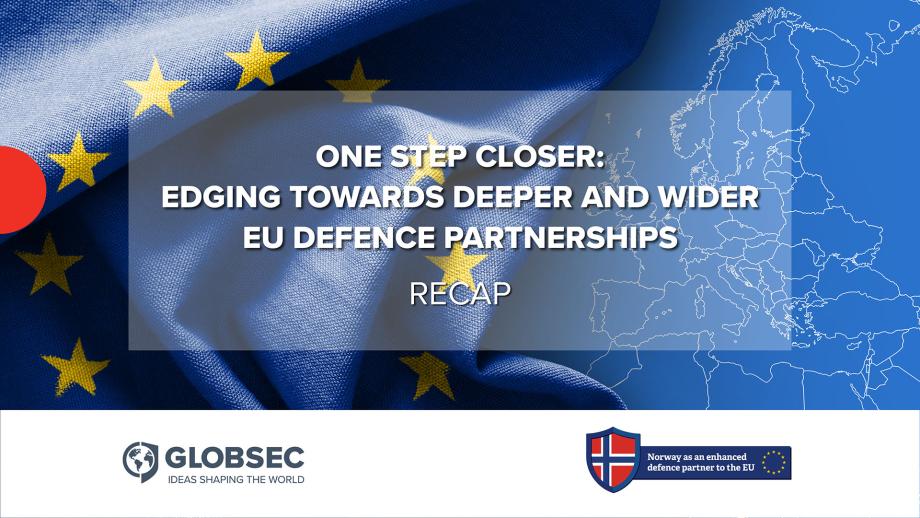One Step Closer: Edging Towards Deeper and Wider EU Defence Partnerships: Recap

On 9 February 2021, GLOBSEC held a webinar to present the final findings of the report One Step Closer: Edging Towards Deeper and Wider EU Defence Partnerships. The online event hosted the following speakers, three of whom are authors of the report:
Ambassador Stefano Stefanini, former Diplomatic Advisor to the President of Italy (2007-2010), former Permanent Representative of Italy to NATO
Tomáš A. Nagy, Advisor to the State Secretary at Ministry of Defence of the Slovak Republic
Mathilde T.E. Giske, Junior Research Fellow, the Norwegian Institute of International Affairs (NUPI)
Marcin Terlikowski, PhD, head of International Security Programme in the Polish Institute of International Affairs (PISM).
The EU faces a unique period of challenges as Europe navigates institutional and policy reforms: Brexit, the effects of the Trump administration, and instability in the region. As the EU works towards a more robust security and defence policy, the enlistment of allies and third parties is essential for successful cooperation. This study aims to describe how third-party participation in the strategic context may occur, specifically for Norway as an enhanced defence partner to the EU.
The main topics discussed during the presentation of the report’s findings were the context and hypotheses of the study, the favorability of Norway as a partner for the EU security, and the possible benefits and challenges involved with a third party brought to the European security.
Overall, the study was successful in correctly predicted advancements in European security and the 3rd party participation — there is just no clear idea of specific projects in which the EU will be collaborating with their partners yet. However, European integration is a process, and it is most important that the EU is still able to continue to provide deliverables on objectives, proving that strategic patience is nowadays still relevant.
Who might be the prime targets for the cooperation and how can they contribute?
The phrase “third party” can refer to a lot of countries but based on the caveats adopted for third party cooperation, the US, the UK, and Norway were selected as primary targets. The UK will likely slowly engage towards Europe after cooling off from Brexit, and hopefully, the new Biden administration in the US will normalize its relationships with member states in the EU after volatility during the Trump administration. Norway is in a favourable position for partnership with the EU as a third party based on their political relationship with the EU and their unique geographical position. In contrast with Brexit, Norway has proven that a third country can hold a strong, mutually beneficial relationship with the EU. Norway has aligned itself with the EU values and enjoys traditional foreign policy and close cooperation with the EU. Lots of security initiatives are ad hoc and informal, but a partnership with the EU would allow Norway in a fixed way to communicate — its political will to work with the EU strongly appears as it seeks multiple benefits in cooperating.
While the concerns regarding Norway’s participation in the fund and possible tensions within the transatlantic relationship are legitimate, it is essential that the EU embrace the current momentum and engage the non-EU NATO members in PESCO and EDF projects where possible. Close cooperation with the EU and NATO should be deepened to reassure the EU member states on a security level. Norway has the potential to be a trailblazer in contributing to the EU security operations and solidifying the EU as a strong global “European pillar.”
